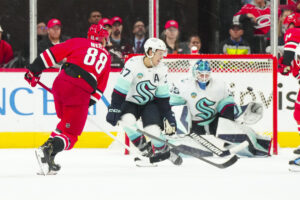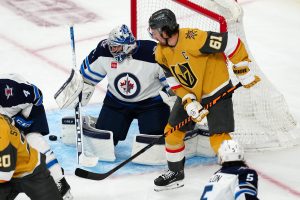In recent articles, we’ve discussed the state of the San Jose Sharks. We’ve reviewed the most important question individuals in the organization must address. We’ve recognized the essential need for hard honesty over teal-tinted glasses. We’ve even walked into the trading bazaar, and described a bizarre trade. It all focuses on the upcoming offseason and how it is handled by the team’s current general manager Doug Wilson.
There is a central premise. The time for a rebuild is now. And this rebuild will provide the San Jose Sharks a good chance to re-emerge as a highly competitive team in the 2025 timeframe.
It’s Time for Doug Wilson to Start Rebuilding the Sharks
The Rebuild Basics
If the Sharks target becoming a competitive team again in the 2025 timeframe, they need to look at the roster and consider who is likely to be helpful in that timeframe and who isn’t.
Among those unlikely to be helpful, almost everyone who was a highly paid contributor this season. You know the names: Martin Jones, Evander Kane, Erik Karlsson, Marc-Edouard Vlasic, Brent Burns and Logan Couture. In 2025, Kane will be the youngest of this group, at age 34. The others will be 35 or older. Among this group, only Jones has a contract that expires before 2025.
From the perspective of the Sharks in 2025, these players are all liabilities. They can all go. It is harsh but honest. This is the sort of process general manager Doug Wilson, or his successor if owner Hasso Plattner decides Wilson is not longer right for the job, needs to go through. This season was an opportunity wasted. The Sharks can not waste opportunity again.
The Not So Bizarre Trade
The seemingly bizarre trade proposal we discussed previously was with the Calgary Flames. It sent a still very good Erik Kalrsson to Calgary for the very mediocre Milan Lucic. Shockingly, what appears bizarre is that it actually makes sense for everyone involved.
Pulling back out, the reason the trade proposal makes sense is this: it trades now for later. In this case, Calgary gets a massive talent upgrade now and becomes instantly more competitive. They shed a horrid contract now, but risk a problematic contract later.
The Sharks have a meaningful asset they can employ now which will benefit the team later. The element is cap space.
Wilson can take the approach of trading for other teams bad contracts and getting assets in return. He can create more cap space by trading away Karlsson.
A few seasons back, the Carolina Hurricanes traded for Patrick Marleau, then bought out the final season of Marleau’s deal. The Toronto Maple Leafs gave the Canes a first round pick for that. It is just one example of the value of salary cap space. Here, $6.25 million of cap relief equated to a first-round draft pick. Can Wilson harvest that sort of value? Or at least something similar?
Bad Contracts
Wilson needs to look around the league and trade his bad contracts for other bad contracts. Here, Doug Wilson has one advantage. His bad contracts are with decidedly more useful players. The disadvantage, the contracts have longer to run.
Here are three bad contracts teams will wish to shed.
Zach Parise, Minnesota Wild, 4 more years, $7.5 mil per year
Milan Lucic, Calgary Flames, 2 more years, $5.25 mil per year
James Neal, Edmonton Oilers, 2 more years, $5.75 mil per year
Each team is competitive now (two are in the playoffs). Each team can get better next season by trading away a player clearly under performing his deal (I’ll note, CapFriendly has Parise and Neal listed among their popular buyouts).
It would be wise for Wilson to trade Karlsson for any of the three players above with their problematic deals. Any of the three teams will benefit considerably with the addition of Karlsson, who’ll provide a massive leap in talent. Meanwhile, the Sharks will add cap space to take additional bad deals from other teams in return. The Sharks did this recently, when Doug Wilson facilitated the Mattias Janmark trade. He took absorbed part of another team’s cap hit in return for a fifth round draft pick.
If the Karlsson for Lucic deal is too bizarre, perhaps Karlsson for Parise makes more sense. Then acquire Lucic and Neal, getting first round picks in return, with perhaps a modest player such as Dylan Gambrell or Ryan Donato headed the other way. Giving Calgary and Edmonton each over $10 million in cap relief over two seasons gives them enormous room to upgrade. They win now, especially in this flat-cap era. The Sharks do better later.
Trade Obstacles
Some will astutely note that Karlsson has a ‘no movement clause’. True enough. This is why honesty is so essential: “the team is going through a rebuild and it will not expect to be competitive for the next three seasons. Do you want to remain in San Jose?”
For a player like Karlsson, or for that matter, any of the Sharks veterans in (or soon to be in) their 30’s, this is an uncomfortable question. Some may wish to stay for a rebuild, but others will not. None of the veterans have a Stanley Cup on their resume, asking them to play three more non-competitive seasons on a rebuilding team is a big ask.
Three Trades for Doug Wilson
Wilson should trade for all three of the aforementioned players on bad contracts. What is the end result?
The Sharks lose Erik Karlsson and his contract. A talented player, but one who’ll be more liability than asset in 2025 when his cap hit is taken into account.
In return, the Sharks acquire three players who are fourth liners at this point in their careers. But for taking these three contracts off the hands of playoff competitive teams, the Sharks can expect to extract perhaps as much as a pair of first round picks. After all, the Sharks are saving two teams a combined cap hit of $22 million.
The Expansion Draft Factor
The Sharks would then expose all these forwards to the Seattle Kraken expansion draft, along with goalie Jones and defenceman Vlasic — and protect everyone else. Again, the astute will note Vlasic has a no movement clause. But Wilson will get Vlasic to waive it for two reasons. First of all, it is highly unlikely he’ll be selected. His contract is too big and too long for the Kraken. And second, in the unlikely event he does get selected, he is not going to be stuck in a multi-year rebuild. After all, the NHL’s most recent expansion team was instantly competitive.
The Kraken would then likely select a player such as Matt Nieto, a pending unrestricted free agent. Not a meaningful loss for the Sharks and their 2025 objective.
The Result
This leaves the Sharks eating a boatload of money on the contracts of Lucic, Parise and Neal. But the cap relief is sufficient they will not have to buyout Martin Jones. A buyout of Jones would negatively impact the team for six more years. As much as fans want Jones (and some others) gone, if the team can avoid paying this cost, they will be well-served. To be clear, they do not have to play Jones, just pay him. Buyouts address “now problems” and create “later liabilities”. The last thing the Sharks need are later liabilities.
By the the time the 2024-25 season rolls around, the Sharks will have seen the contracts of Lucic, Neal and Jones expire. It’ll be the final season on Parise’s contract and the final contract season for current Sharks Brent Burns and Evander Kane. Both have trade value now, should they decide they do not want to spend three seasons of rebuilding. Let’s assume the Sharks can get a first round pick for each.
The lone contracts which extend into 2025-26 belong to Vlasic and Couture. And if the Sharks want to trade Couture, he likely fetches a first round pick, plus something more.
In sum, this has the Sharks emerge with meaningful draft picks, perhaps as many as five additional first round picks (nine total first round picks between now and the completion of the 2024 draft). Plus, there will be substantial cap space in the 2025 timeframe. The team can be very young, too, as most of the team’s remaining core players will still be in their 20’s come 2025.
The Sharks Path Out
The bottom line is this. The Sharks need to embrace the rebuild. It’ll make for some uncomfortable decisions. But they must be made. The owner must reject any plan which isn’t a true rebuild.
Doug Wilson is competitive by nature, which makes it difficult for him to accept this sort of plan. But if he is unable to accept this choice and execute on such a plan, the owner needs to replace Wilson and find someone who will.
One can live with the gamble Doug Wilson took, hoping to snare a Stanley Cup with premium talent playing at the top of their game. I’ve written it was a worthwhile gamble and I stand by that assessment, “Wilson’s strategy was legit and defensible. It just didn’t work.” It is time to recognize the gamble failed and go all-in on a serious rebuild. Wilson hedged his bets heading into the 2021 season. There is no more room for another offseason of hedged bets. Anything less than a commitment to a full rebuild is a plan for failure, now and in the years to come.
Zeke’s Notes
Come the expansion draft, should the Sharks make some or all of the above trade moves, the team can leave the Kraken with few good choices. They can protect their entire core, leaving mostly players on expiring contracts. Indeed, other than Neal, Lucic and/or Parise, the Kraken’s choices of players under contract could be limited to Jayden Halbgewachs (RFA 2022) and Jacob Middleton (RFA 2022).
Main Photo






